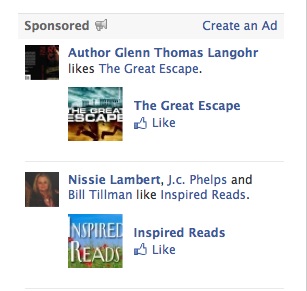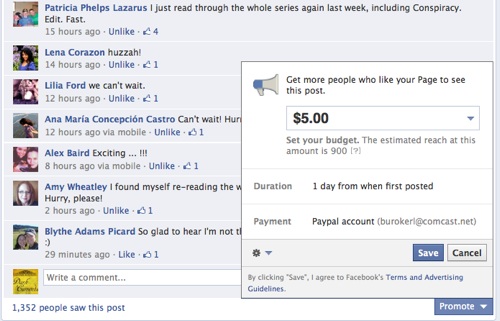You spend years writing, editing, and polishing your first book, and when it’s finally published, all you’re worried about is whether people will like it. You don’t worry about whether people will buy it or even know it exists. But (and this realization comes more quickly if you self-publish and you can check your sales statistics in real time), you soon realize that obscurity is the biggest concern. Before people can decided they love the book (and leave all sorts of warm, fuzzy reviews), they have to find it and give it a chance.
Online advertising is one way that authors are trying to “be found,” especially authors who have a few extra pennies to spend on book promotion.
As we’ve talked about before, there are a few types of online advertising that authors might use: pay-per-impression (you buy ad space by thousands of “views”), flat-rate (you pay a set amount to have your book featured for a day, week, etc. on a blog, forum, or other website), and pay-per-click (your ad is displayed to a large viewership, but you only pay if someone clicks on it).
I’m going to blather impart important information on the pay-per-click model today, specifically Facebook’s version.
How Facebook Advertising Works
 With Facebook, you create a short text-based ad that will run only on Facebook, being shown only to people in the demographic you target. You don’t pay to create the campaign; you only get charged when people click. How much you pay per click depends on what you “bid” for clicks. A higher bid will get you more prominent positioning.
With Facebook, you create a short text-based ad that will run only on Facebook, being shown only to people in the demographic you target. You don’t pay to create the campaign; you only get charged when people click. How much you pay per click depends on what you “bid” for clicks. A higher bid will get you more prominent positioning.
For authors, you don’t generally have to bid much (perhaps 10 or 20 cents), as we’re not in a terribly competitive market space. That’s good, because we don’t stand to make much per sale either, not when we’re selling our ebooks for $1-$5. (Naturally, the numbers get better if you have a series with a good buy-through ratio, meaning you can count on a large number of the people who grab the first book to go on to purchase the other four or six or whatever it is.)
One thing I like about Facebook advertising over, say, Google Adwords, is that you can target a very precise viewership. Thanks to the “like” system, and many other factors, Facebook knows a ton about its users. Let’s say you’re a science fiction author. It’s possible to only display your ads to men between the ages of 18 and 29 who are fans of Star Wars, Battlestar Galactica, or Orson Scott Card. This serves to keep costs down (no drive-by clicks from parties who aren’t likely to be interested in your work) while potentially connecting you with your ideal audience.
Speaking of costs, I’ve heard (and I haven’t tested this to back it up) that ads cost less over time if your destination URL (the place people go after clicking an ad) is a Facebook page (i.e. your author fan page) instead of an external site (i.e. your blog or your book’s page at Amazon). You also get more than a click if you’re sending folks to an internal page–a “like” option shows up on the ad. If you’ve just built your author fan page, and you’re hoping to get a few starter likes (social proof and what not), this can be an added perk.
If you decide on an internal destination, you can link to your wall or any tab on your author fan page (i.e. a book page you’ve created that includes an excerpt). As of a couple of months ago, you can even promote specific posts on your news wall.
How Facebook’s Promoted Posts Work
Facebook now lets you promote specific posts that you’ve made to your new feed (wall). The video in that link explains how everything works, but basically it’s a way to get people who have already liked your page to come back and see what’s new (it also reaches friends of those who have liked your page).
 Some people get cranky about this concept (why pay to advertise to people who are already your fans?), but, if you spend any time on Facebook, you already know that a “like” doesn’t count for much. You’ve probably liked hundreds, maybe thousands of pages, and have noticed that none of the updates for those pages appear on your personal news feed. The exceptions are those pages with which you interact regularly. That makes sense — think how cluttered your feed would be if every news story from Star Wars, Eddie Bauer, REI, Whole Foods, and The Big Bang Theory showed up on your home page. You’d never see the updates from your flesh-and-blood friends.
Some people get cranky about this concept (why pay to advertise to people who are already your fans?), but, if you spend any time on Facebook, you already know that a “like” doesn’t count for much. You’ve probably liked hundreds, maybe thousands of pages, and have noticed that none of the updates for those pages appear on your personal news feed. The exceptions are those pages with which you interact regularly. That makes sense — think how cluttered your feed would be if every news story from Star Wars, Eddie Bauer, REI, Whole Foods, and The Big Bang Theory showed up on your home page. You’d never see the updates from your flesh-and-blood friends.
Though that might make sense, the downside is that a “like” doesn’t get you much as an author. As I write this post, I have 1200-odd likes, and I’d say that maybe 100 people interact with my fan page regularly (leaving comments or likes on my posts). Advertising a specific post (maybe one that lets people know you have a new book out or offers a coupon/free-download on an existing book) is a way to bring back those folks who were interested enough to like your site once but haven’t been back in a while.
Costs are low for promoting specific page posts, too, as the only spending options are $5 and $10. You can select how long the promotion will run (from 1-3 days), and Facebook will spread your funds out over that time, charging you only when someone clicks.
So, does any of this stuff work to sell books? Are Facebook ads worth the money? As of last week, I’ve tried both types of ads (the sponsored links that go out to a targeted audience and the promoted posts that go out to people who’ve liked your page). Later this week, I’ll give you the lowdown. Stay tuned!




Helpful as always, I know that I for one don’t go out of my way to look up ways to publicize, so I appreciate that you put up informative posts like this. Just knowing that I can come poke around here to find a starting point makes my someday advertising less daunting.
Also, thanks for being awesome. Sharing the real world outcomes of your various endeavours isn’t something that you need to do, but it’s cool beyond words that you’re willing to run these experiments and publish your results.
By the by (and completely off-topic), did you hear about Kevin Kelly’s kickstarter for his graphic novel, The Silver Cord? I’m not sure if it’s going to fund, but there’s still a 200 page free comic out there for the taking.
I respect Kevin Kelly and appreciate his true fans post but I balked at someone asking $40k to fund a book. Why does he need such an elite team of artists? That need to be paid to work on something it sounds like they all love? People usually create books with the expectation that they’ll get paid by royalties later on, not earn a salary up front…
Thanks, Sky! I’ll check out the comic. Sounds fun. 🙂
Thank you, I’ve been wondering how those promoted posts work. It might be fun to try and it doesn’t cost much.
Thanks for the post, Lindsay, although you’re cruel for playing the “tune in next time for the startling conclusion…” trick. 🙂
I was dead against doing facebook, but results are results. Advertising on the world’s most popular site makes perfect sense. I think the “only writing is time well spent” crowd is ignoring promotion because it represents a whole new skillset to be learned (and because most of the advice involves spamming, which Good Upstanding People hate by instinct.)
Haha, sorry, Jim! I was going to include it here, but the post was already close to a thousand words. I don’t do brevity well. 😉
My Facebook results haven’t been staggering (though I had enough success with the promoted post that I’ll definitely do that again), but they haven’t been a flop either. I’m very careful about the way I put together the ads (for instance, if all I have is ebooks, I make sure to mention that in the ad, so that dead-tree-only folks won’t click and waste my money), so that I’m able to at least break even.
One of the big perks of Facebook/Goodreads advertising is that it’s mostly a set-it-and-forget-it type of thing. Trying to promote on Twitter, blogs, and forums, on the other hand, involves a big outlay of time for an author, not just once but day after day if he/she wants to see results. That’s often time that might be better spent writing the next book. Or maybe writing a story that can be given away for free. That’s by far the best “advertising” I’ve done. 🙂
Thanks for commenting!
I will echo the others here, Lindsay, in saying thanks for another great post. As someone who may have to be dragged into Facebook kicking and screaming, I eagerly await the outcome of your diligent efforts.
Would you mind sharing what demographic you targeted and how you decided they would be most likely to buy your books?
There’s some of that in the follow-up post, Jumana: https://www.lindsayburoker.com/advertising-ebooks-2/does-facebook-advertising-work-one-authors-experience/
Pingback: Friday Features #14 | Yesenia Vargas
Pingback: Writing Blog Treasures 7~21 | Gene Lempp ~ Writer
Pingback: Blogs for self-publishers July 15 – 21, 2012 — The Book Designer
As you can tell I am following your Facebook trail… so many goodies to pick up along the way. 🙂 Moving on to that next post now that was mentioned in the comments.
I’m a “newbie” author who was looking for information on how to begin building my platform and promote/advertise my first mystery/thriller book written close to the style of the James Patterson novels. Being on a very tight budget, I needed all the advice and help I could find regarding promotion.
Your articles regarding using Facebook to advertise are fantastic, well-written, clear, concise, and easy to follow. (I followed a link to your site in BookLife’s newsletter.) I’ve actually saved your articles in PDF format for future reference.
As soon as I’ve established my Facebook Author page, I’ll be Following and Liking your Facebook page and have already bookmarked this site.